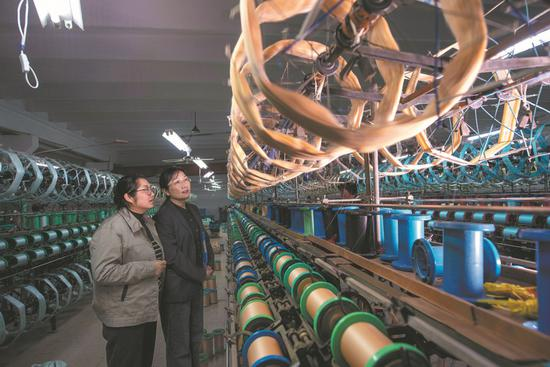A view of a privately owned textile company in Nantong, Jiangsu province. (Photo provided to China Daily)
Greater reform to advance urbanization and reinforce the role of the market in the economy will play a pivotal role in lifting China's economic growth in the coming five years, which should be able to reach about 5 percent annually, economists and officials said on Friday.
The period of next five years has assumed significance for China's modernization drive as the Communique of the third plenary session of the 20th Central Committee of the Communist Party of China, released on Thursday, said that the reform tasks decided at the meeting shall be completed by the time the People's Republic of China celebrates its 80th anniversary in 2029.
Liu Qiao, dean and a professor of finance at Peking University's Guanghua School of Management, said a clear message was conveyed regarding China's path to modernization during the third plenary session — greatly leveraging the effective role of the market to enhance resource allocation efficiency.
"A key takeaway from the session is the emphasis on reforming and improving systems and mechanisms to foster a dynamic and transparent market environment over the next five years," Liu said in an exclusive interview with China Daily on Friday.
Liu said this means that China aims to further create a level playing field for enterprises of different ownerships, an approach that will probably give the private sector a dose of confidence and marks a step forward in market-oriented reform that is key to fostering new quality productive forces.
His remarks echoed those of Han Wenxiu, executive deputy director of the office of the Central Committee for Financial and Economic Affairs. Han told a news conference on Friday that China will give better play to the role of the market mechanism, improve the rules for the labor and other factor markets and speed up the building of a new development model for the property sector.
"If I have to pick one single area to implement dramatic reform measures, I would say the property market model would be the most important one," Liu said.
Accommodating the more than 400 million population — including about 150 million now living in rural areas and about 255 million living in cities but have no hukou or household registration — in cities will bring tremendous economic opportunity by driving substantial investment in public services and housing, Liu said.
This process will necessitate accelerated efforts to develop a rental housing system, Liu said, stressing the need for expanding the size of a central bank funding program of converting commercial housing stock into rental public housing and introducing more private-sector players into the scheme.
Reforming the hukou system is also crucial and will "definitely" be seen in the coming years, as once migrant workers get urban hukou, their willingness to invest and consume will increase, Liu said.
With the plenary session having shed light on market-oriented reforms and further urbanization efforts, Liu said China is better poised to address the challenge of slowing total factor productivity growth, a measure of productive efficiency and a key source of economic growth.
"Given that, I believe it is very likely that the TFP growth in China will bounce back and increase from the current 1.8 percent to about 2 percent. And if that happens, I think the GDP growth rate will be somewhere around 5 percent in the next five years."
That will help set the stage for China to double its GDP per capita from its 2020 level (71,828 yuan or $9,881) by 2035 and basically achieve Chinese modernization, he said.
China maintaining reasonable economic growth would be important for the world not only because China contributes about one-third of global growth but because the country can provide new solution to the global common challenge of low productivity growth, he said.
China's modernization model combines the role of market forces with the government's top-level design to effectively mobilize resources to confront the problems it faces in development, which is different from the free market paradigm prevalent in the Western economies, Liu said.
In the short term, Liu said the country needs to adopt a more proactive fiscal policy and grant more direct support to households and consumers, to cope with lukewarm consumer and business sentiment as well as any potential external shock that could impede export growth.
Han, the official, also said that China's economic indicators are improving in line with expectations, yet challenges like insufficient demand have created the need for amplifying macroeconomic policy support, including more funding for equipment renewal and trade-in deals for consumer goods.
